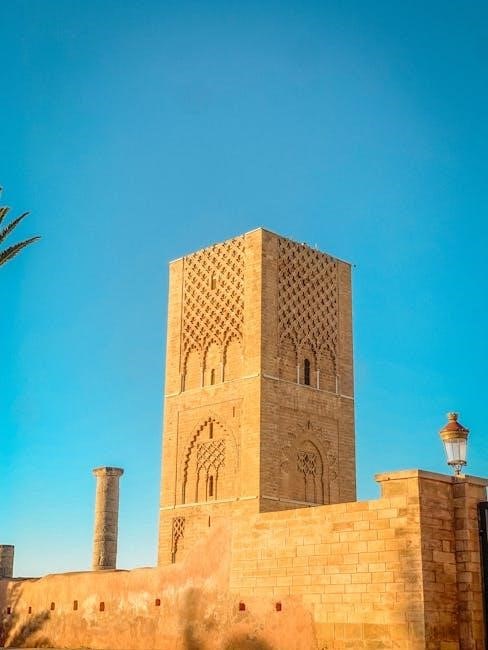Africa‚ despite its vast resources‚ remains the least developed continent‚ facing challenges rooted in colonial history‚ governance‚ and socioeconomic factors‚ hindering its economic potential and growth.
Overview
Africa’s underdevelopment is a complex issue with deep historical roots‚ encompassing colonial exploitation‚ weak governance‚ and socioeconomic challenges. Despite rich natural resources‚ the continent struggles with poverty‚ inequality‚ and lack of industrialization. Historical factors like the slave trade and colonial institutions disrupted local economies and societies. Additionally‚ persistent health issues‚ such as malaria‚ and dependent economic structures have hindered progress. Addressing these interconnected challenges requires comprehensive reforms and investments in education‚ healthcare‚ and governance to unlock Africa’s potential for sustainable development.

Historical Roots
Africa’s underdevelopment stems from the transatlantic slave trade and colonial exploitation‚ which disrupted societies‚ extracted resources‚ and imposed institutions that hindered local economic and social progress historically.
The Impact of the Slave Trade
The transatlantic slave trade significantly contributed to Africa’s underdevelopment by causing massive depopulation‚ disrupting societies‚ and weakening local institutions. The forced removal of millions of people led to a reduction in the continent’s labor force‚ hindering agricultural production and economic growth. This demographic drain also disrupted social structures‚ fostering instability and internal conflict. The legacy of the slave trade persists‚ as it undermined Africa’s ability to develop independently‚ leaving long-term economic and societal setbacks that continue to affect the continent today.
The Legacy of Colonialism
Colonialism deeply impacted Africa’s development by imposing extractive institutions that prioritized resource extraction over local development. European powers displaced indigenous populations‚ disrupted traditional systems‚ and imposed arbitrary borders that often led to ethnic and territorial conflicts. The focus on exporting raw materials hindered industrialization and diversification of economies. Additionally‚ underinvestment in education‚ healthcare‚ and infrastructure left African nations with limited capacity to sustain growth post-independence. These structural legacies continue to influence Africa’s economic and social challenges‚ perpetuating inequality and limiting development opportunities.

Economic Challenges
Dependency on Primary Commodities
Africa’s reliance on primary commodities exacerbates economic instability‚ as global price fluctuations disrupt revenue streams‚ hindering industrialization and limiting value-added industries‚ perpetuating underdevelopment.
Africa’s economies heavily rely on primary commodities like oil‚ minerals‚ and agricultural products‚ leading to vulnerability from global price volatility. This dependency stifles industrialization and diversification‚ as nations focus on extracting raw materials rather than developing value-added industries. Over-reliance on commodities hinders long-term growth‚ exacerbates poverty‚ and limits economic resilience. Without structural transformations‚ African nations remain exposed to external shocks‚ undermining efforts to achieve sustainable development and economic stability in an increasingly competitive global market; Diversification is critical to breaking this cycle.
Lack of Industrialization
Africa’s underdevelopment is exacerbated by a lack of industrialization‚ with economies relying heavily on raw materials and imports. Weak institutional frameworks and limited investment in infrastructure hinder manufacturing growth. The colonial legacy of extractive economies persists‚ prioritizing resource extraction over value-added production. This underinvestment in industry undermines economic diversification and resilience‚ leaving nations vulnerable to global market fluctuations. Without robust industrial sectors‚ African countries struggle to achieve sustainable growth‚ perpetuating dependence on external economies and limiting their ability to compete on a global scale. Structural transformation is essential for long-term prosperity.

Governance Issues
Africa faces significant governance challenges‚ including weak institutions‚ corruption‚ and political instability‚ which hinder development and perpetuate underdevelopment across the continent‚ undermining accountability and progress.
Weak Institutions and Corruption
Weak institutions and pervasive corruption are critical barriers to Africa’s development; Corruption undermines public trust‚ diverts resources‚ and hinders effective governance‚ perpetuating inequality and poverty. Poor institutional frameworks fail to enforce rule of law‚ leading to mismanagement and abuse of power. This misallocation of resources stifles economic growth and discourages foreign investment. Without strong‚ accountable institutions‚ Africa struggles to achieve sustainable progress‚ as corruption entrenches a cycle of underdevelopment and social injustice‚ further marginalizing vulnerable populations and hindering long-term prosperity.

Social Factors
Social inequality and cultural barriers significantly hinder development by limiting access to essential opportunities and perpetuating disparities‚ thereby affecting overall economic and social progress in Africa.
Ethnic Diversity and Conflict
Africa’s ethnic diversity has often led to fragmentation‚ weakening national unity and institutions. Ethnic conflicts‚ fueled by historical grievances and resource competition‚ disrupt socioeconomic stability. Scholars like Easterly and Levine highlight how ethnic polarization leads to suboptimal policies and weak governance. Additionally‚ the legacy of slave raids and violence has eroded trust in institutions‚ perpetuating lawlessness. These factors create a cycle of instability‚ hindering development and integration‚ as diverse groups struggle to align under unified goals‚ further complicating Africa’s path to prosperity.

Health Issues
Africa faces severe health challenges‚ with malaria being a leading cause of mortality and morbidity‚ significantly reducing productivity‚ savings‚ and annual economic growth rates by 1.3%.

Malaria and Other Diseases
Malaria is a critical health issue in Africa‚ significantly impacting economic development. Studies show malaria reduces annual growth rates by 1.3% and lowers savings and productivity. High mortality and morbidity rates disrupt households‚ reducing investment in the future. Other infectious diseases compound these challenges‚ creating a cycle of poverty and underdevelopment. Addressing malaria and improving healthcare infrastructure are essential for fostering economic growth and stability across the continent.
Environmental Impact

Africa’s diverse geography and climate present significant challenges‚ with deserts‚ tropical climates‚ and resource scarcity affecting economic activities and development‚ exacerbated by environmental degradation and climate change.
Geography and Climate
Africa’s diverse geography and climate present significant challenges. The Sahara Desert‚ tropical regions‚ and varied terrains create barriers to transportation and economic activities. Resource-rich areas often face exploitation‚ while arid zones struggle with water scarcity. Climate variability impacts agriculture‚ a cornerstone of many economies‚ leading to food insecurity. Additionally‚ extreme weather events and environmental degradation exacerbate underdevelopment‚ limiting infrastructure growth and hindering sustainable progress across the continent.

Education
Limited access to quality education in Africa hinders development. High illiteracy rates persist due to inadequate infrastructure and funding‚ while brain drain exacerbates the lack of skilled professionals‚ perpetuating underdevelopment.

Access to Quality Education
Africa faces significant challenges in providing quality education‚ with limited access to schools‚ trained teachers‚ and resources. High poverty levels force many children to work instead of attending school. Poor infrastructure and frequent teacher shortages exacerbate these issues. Additionally‚ cultural barriers and gender disparities further restrict educational opportunities‚ particularly for girls. The brain drain of skilled professionals to developed nations worsens the problem‚ leaving few qualified educators to address these systemic issues. This cycle perpetuates underdevelopment by limiting human capital and innovation potential across the continent.
International Effects
Globalization has shaped Africa’s economy through trade imbalances and foreign aid‚ often perpetuating dependency and limiting self-sustaining growth‚ influenced by international policies and structures.
Effects of Globalization
Globalization has profoundly shaped Africa’s economic landscape‚ often perpetuating underdevelopment through unequal trade systems and dependency on foreign aid. Multinational corporations exploit Africa’s resources‚ extracting wealth without reinvesting in local economies. This has led to a lack of industrialization and diversification‚ keeping many countries reliant on primary commodities. Additionally‚ globalization has intensified competition‚ marginalizing African economies in global markets. The digital divide and limited access to technology further exacerbate these challenges‚ hindering Africa’s ability to compete on a global scale and achieve sustainable development.
Leadership Role
Africa’s underdevelopment is exacerbated by weak leadership and governance‚ emphasizing the need for visionary leaders to implement effective policies and foster sustainable development across the continent.
Need for Visionary Leadership
Africa’s development hinges on visionary leadership that prioritizes long-term growth over short-term gains. Effective leaders must address corruption‚ promote transparency‚ and foster inclusive governance. Strong institutions are essential for sustainable development. Visionary leaders should invest in education‚ infrastructure‚ and innovation to unlock Africa’s potential. They must also promote self-reliance‚ reducing dependency on external aid. By adopting policies that empower local economies and encourage entrepreneurship‚ leaders can drive meaningful change and create a prosperous future for the continent.
Regional Variations
North Africa and Sub-Saharan Africa exhibit contrasting development trajectories due to differing historical‚ economic‚ and cultural contexts‚ highlighting the continent’s diversity and unique regional challenges.
North Africa vs. Sub-Saharan Africa
North Africa‚ with its closer ties to Europe and the Middle East‚ has experienced relatively higher economic growth and industrialization compared to Sub-Saharan Africa. Historical factors‚ such as colonial policies and resource extraction‚ have shaped these disparities. North Africa’s strategic location and stronger institutional frameworks have facilitated better infrastructure and trade networks. In contrast‚ Sub-Saharan Africa faces deeper challenges‚ including ethnic conflicts‚ political instability‚ and geopolitical marginalization. These regional variations underscore the complexity of Africa’s underdevelopment‚ highlighting the need for tailored solutions to address unique local contexts and historical legacies.
Solutions
Policy reforms and strategic investments in infrastructure‚ education‚ and healthcare are essential for fostering economic growth and self-reliance in Africa.
Policy Reforms and Investments
Policy reforms and strategic investments are critical to addressing Africa’s underdevelopment. Strengthening institutions‚ improving governance‚ and fostering transparency can create a conducive environment for sustainable growth. Investments in infrastructure‚ such as transportation and energy‚ are essential for economic transformation. Promoting industrialization and diversifying economies can reduce reliance on primary commodities. Additionally‚ investing in healthcare and education systems will enhance human capital and productivity. International cooperation and foreign direct investment can further support these efforts‚ enabling African nations to achieve long-term prosperity and self-reliance.
